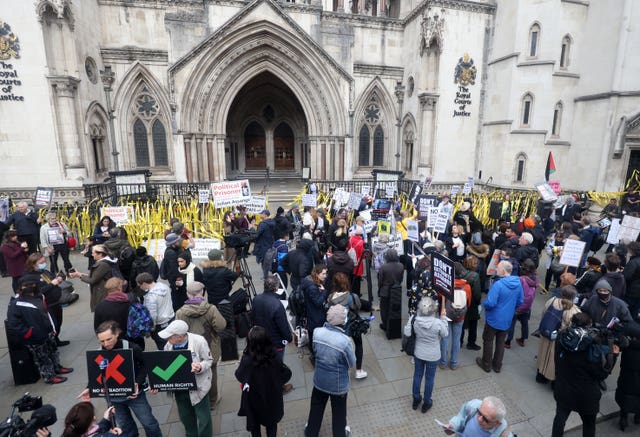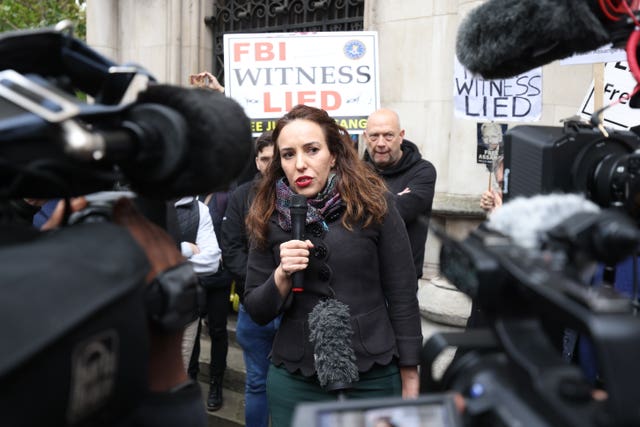
Blocking Julian Assange’s removal to the US due to his mental health risks “rewarding fugitives for their flight” and giving a “trump card” to people looking to avoid extradition, the High Court has heard.
Assange, 50, is wanted in America on allegations of a conspiracy to obtain and disclose national defence information following WikiLeaks’ publication of hundreds of thousands of leaked documents relating to the Afghanistan and Iraq wars.
After a multi-week extradition hearing, then-District Judge Vanessa Baraitser ruled in January that Assange should not be sent to the US, citing a real and “oppressive” risk of suicide.
She found that “the procedures described by the US will not prevent Assange from finding a way to commit suicide”.
On Wednesday, the US authorities began their attempt to overturn the district judge’s decision at the High Court.
After initially indicating he would not attend Wednesday’s hearing, Assange observed via videolink from Belmarsh Prison in south-east London, appearing to wear a black face covering and a burgundy tie.
James Lewis QC, for the US, told the court that the district judge based her decision on Assange’s “intellectual ability to circumvent suicide preventative measures”, which risked becoming a “trump card” for anyone who wanted to oppose their extradition regardless of any resources the other state might have.
He continued: “The district judge’s approach carries with it the risk of rewarding fugitives for their flight, and of creating an anomaly between the approach of the courts in domestic criminal proceedings and in extradition.
“In the domestic context, it would never be said that an individual accused of crimes of the severity of Mr Assange’s could not be put on trial, despite being fit to be tried, because of his determination to commit suicide.”

The US authorities have also argued Assange is well enough to be extradited, with Mr Lewis telling the court his mental illness “does not even come close” to being severe enough to prevent being sent to the US.
The barrister later said there was a “need for anxious scrutiny” and “caution” regarding Assange’s self-reported mental health, adding: “Mr Assange had every reason to exaggerate his symptoms.”
Mr Lewis also told the court the district judge “entirely based her decision” on the risk Assange would be submitted to special administrative measures and detained at the ADX Florence Supermax jail, if extradited.
However, he said four “binding” diplomatic assurances had been made, including that it would consent to him being transferred to Australia to serve any prison sentence he may be given, which “fundamentally change the factual basis” of her judgment.
A crowd of Assange supporters, including his partner Stella Moris, gathered outside the Royal Courts of Justice in central London ahead of the hearing, chanting and playing loud music.
Ms Moris, who was later seen in the public gallery of the court, told reporters: “I hope the courts will end this nightmare, that Julian is able to come home soon and that wise heads prevail.”
Edward Fitzgerald QC, for Assange, told the court in written arguments that the US authorities had “sought to minimise the severity of Mr Assange’s mental disorder and suicide risk”.

He continued: “It is perfectly reasonable to find it oppressive to extradite a mentally disordered person because his extradition is likely to result in his death.”
He added the assurance that Assange could be transferred to a prison in Australia if convicted was “meaningless”, adding that Assange “will most likely be dead before it can have any purchase, if it ever could”.
Mr Fitzgerald said that the district judge correctly relied on the “inevitable fact” Assange would be detained in isolation and deprived of protective factors he experiences in Belmarsh if extradited.
Mr Fitzgerald concluded: “None of the assurances now belatedly offered, even if admitted, would actually address the district judge’s concerns about the likelihood and effect of the imposition of extreme isolation, or the very prospect of it, on Mr Assange’s fragile mental health.
“All are caveated, vague, or simply ineffective. None offer any concession or ‘assurance’ against the application of existing US practice.”
Assange has been held in Belmarsh Prison since 2019 after he was carried out of the Ecuadorian embassy in London by police before being arrested for breaching his bail conditions.
He had entered the building in 2012 to avoid extradition to Sweden to face sex offence allegations, which he has always denied and were eventually dropped.
The hearing before the Lord Chief Justice Lord Burnett and Lord Justice Holroyde is expected to end on Thursday with a decision at a later date.


Comments: Our rules
We want our comments to be a lively and valuable part of our community - a place where readers can debate and engage with the most important local issues. The ability to comment on our stories is a privilege, not a right, however, and that privilege may be withdrawn if it is abused or misused.
Please report any comments that break our rules.
Read the rules hereComments are closed on this article